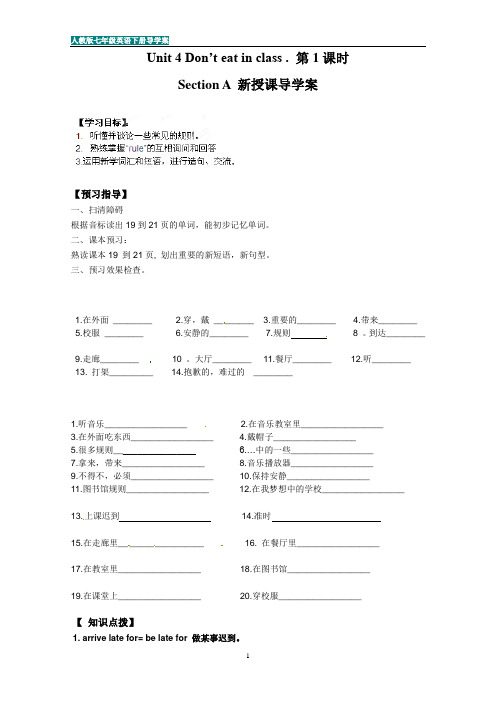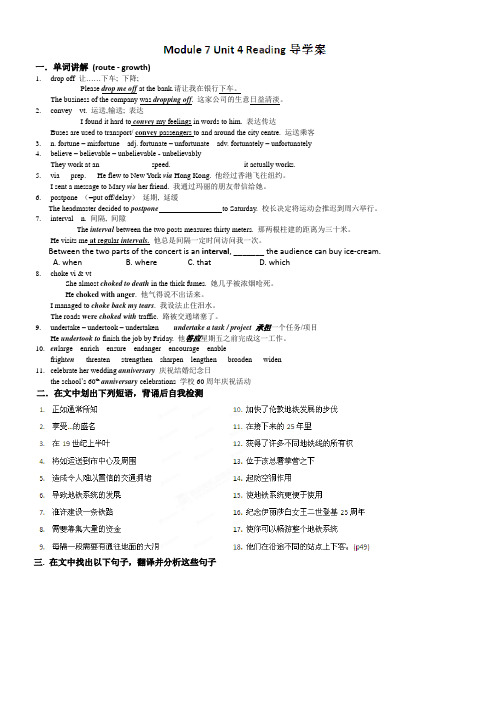Book 7 Unit4导学案
- 格式:doc
- 大小:55.50 KB
- 文档页数:2

Unit 4 Where’s my backpack?Where’s my backpack? 我的背包在哪里?Where 是疑问副词,意为“在哪里,在什么地方”,引导特殊疑问句。
句型:Where + is\are +主语(人或物)?答语:主语(人或物)+ is\are +方位介词。
如:-Where is Gina? -she’s in the classroom.注意:Where is 可以缩写成Where’s,Where are可以缩写成Where’re.翻译短语1.在沙发上_______2.在床下___ _____3.在我背包里__________4.在桌上________5.under the chair___________6.on the dresser________ _7.in the drawer__________一、选择填空。
( )1. ___________ is your new pencil case? It’s in the bag.A. WhatB. WhereC. HowD. Who( )2.Is he Jack Smith? _________________.A. Yes, he’sB. Yes, it isC. Yes, he isD. No, it isn’t( )3.The boys are ___ the tree.A. onB. inC. toD. for( )4.-Where are Lucy’s friend? -___ in the room.A. TheyB. They isC. ThemD. They are( )5.Are these Dave’s CDs?_________________________.A. Yes, these areB. No, they areC. Yes, they are二.句型转换。
1.My backpack is under the sofa.(对画线部分提问)_________________________ 2.His books are on the sofa.(改为一般疑问句)______________________________ 3.Are your books on the table?(作否定回答)________________________________ 4.Her brother is in the tree.(对画线部分提问)________________________________ 5.My pens are in the drawer.(改为否定句__________________________________6. Are those your books? (改为单数形式)____________________________________7. She is my sister.(改为复数形式)_______________________________________ ((Section A 2a-4))(2) 表示方位的介词或短语还有:In(在...里面), under(在…下面), behind(在…后面), in front of(在…前面),next to(在…隔壁), between…and…(在…和…之间)一.根据汉语意思,完成下列句子。

连词成篇Unit 4. SharingHelping the Remote VillageA year ago, the famous astronaut received an invitation by airmail from a remote village. Intend ing to sniff some fresh air, he and his interpreter paid a fortnight visit there. It was a privilege for them to be there, but they were shock ed by what they saw. The track s were muddy. The river was drying up. Most villagers only possess ed one broom, a few tin s and several jar s and their rectangular grass hut s with round angle s were surround ed by weed s. Besides, their school had no roof and platform, and the students had no concept of click ing a computer at all. They were badly in need.Soon, the astronaut made a generous voluntary donation to the village. There were textbooks for students, sew ing machines for tailor s and tractor s for farmers. His distribution catalogue also included operat ing a clinic and a trunk library, as well as giving weekly lessons to teach relevant farming knowledge like how to dry out seed s or raise ox en. He himself not only helped do some paperwork but also purchase d grill s for boys to toast potatoes and comb s for girls who were dying to get one. The other day, he heard from the villagers again inviting him to participate in the donation anniversary. For political and security reasons, he couldn’t adjust his outgoing arrangement—otherwise he would go. But his deed s were remembered forever.词汇详解1.remote[ ]adj.2.astronaut[ ]n.3.invitation[ ]n.vt.邀请4.intend[ ]vt intend to do sth.n.意图,打算be intended for5.sniff[ ]vt.&vi.6.interpreter[ ]n.7.fortnight[ ]n.8.privilege[ ]n.vt.口译,解释9.shock[ ]vt. n.10.track[ ]n. vt.11.muddy[ ]adj.12.dry[ ]adj. vt. vi.13.possess[ ]vt.in possession of14.broom[ ]n.15.t in[ ]n.16.j ar[ ]n.possession n. take possession of17..rectangular[ ]adj.18.hut[ ]n.19.a ngle[ ]n.20..surround[ ]vt.n.环境be surrounded 被……所环绕21..weed[ ]n.22..roof[ ]n.23.platform[ ]n.24.concept[ ]n.25.in need26.generous[]adj.27.voluntary[ ]adj.volunteer vi. n.volunteer 自愿做某事donate sth. to...28.donation[ ]n.29.sew[ ]vt.& vi.30.tailor[ ]n.31.tractor[ ]n.32.distribution[ ]n.33.catalogue[ ]n.34.clinic[ ]n.35.trunk[]n.36..weekly[ ]adj. adv. / / adj.每日/月/年的37..relevant[ ]adj.be relevant 与……有关联n.关联rise vi.38..raise[ ]vt. , , ,39.seed[ ]n.40.ox[ ]n. [pl.] oxen bull n. cow n. cattle n.41.do some paperwork42.purchase[ ]vt.& n.43.grill[ ]n. vt.44.toast[ ]vt. vi. n.b[ ]n. vt.46.be dying to do sth.47.the other day48.hear from49.p articipate[ ]vi.participate 参加,参与50.a nniversary[ ]n.51.p olitical[ ]adj. policy n politics n. politician n.52..security[ ]n.secure adj. vt.53.a djust[ ]vt.adjust...to adjust to54.o utgoing[ ]adj. , ,55.a rrangement[ ]n.arrange for sb. to do sth.56.o therwise[ ]conj. 否则adj. 另外的;其他方面的adv. 另外;在其他方面57.d eed[ ]n.58.forever[]adv.句型透视1. make a /any difference to 对……有影响;起作用To be honest, I doubt whether I’m(对……有影响) these boys’ lives at all.2. 助动词do/does/did+动词原形对谓语进行强调But last weekend another teacher, Jenny, and I (确实拜访了一个村庄) which is the home of one of the boys, Tombe.3. from where 引导的定语从句We walked for two and a half hours to get there —first up a mountain to a ridge (山脊)( 从那儿我们看到了奇妙的风景)and then down a steep path to the valley below.4. once 引导的时间状语从句(火一着起来), he laid stones on it.5. what if. . . 倘若……怎么办She was dying to see him again but (如果他不想见她怎么办)?选用句型透视中的句式仿写句子(1)身为教师, 你们必须坚信你们能够影响学生。

Unit 4 Don’t eat in class .第1课时Section A 新授课导学案【预习指导】一、扫清障碍根据音标读出19到21页的单词,能初步记忆单词。
二、课本预习:熟读课本19 到21页, 划出重要的新短语,新句型。
三、预习效果检查。
1.在外面________2.穿,戴________3.重要的________4.带来________5.校服________6.安静的________7.规则8 。
到达________9.走廊________ 10 。
大厅________ 11.餐厅________ 12.听________ 13. 打架_________ 14.抱歉的,难过的________1.听音乐_________________2.在音乐教室里_________________3.在外面吃东西_________________4.戴帽子_________________5.很多规则_________________6.…中的一些_________________7.拿来,带来_________________ 8.音乐播放器_________________9.不得不,必须_________________ 10.保持安静_________________11.图书馆规则_________________ 12.在我梦想中的学校_________________ 13.上课迟到14.准时15.在走廊里_________________ 16. 在餐厅里_________________17.在教室里_________________ 18.在图书馆_________________19.在课堂上_________________ 20.穿校服_________________【知识点拨】1. arrive late for= be late for 做某事迟到。
Don’t arrive late for the meeting next time 下次开会别迟到2、语法(祈使句)祈使句是用来表示请求、命令、叮嘱、号召或者劝告等的句子,这类句子的主语常是第二人称you,也就是听话者,因而you常省去了。

Book 7 Unit 4 Sharing 导学案Task I. Skimming1.Divide the passage into 4 parts and match the main idea of each paragraph.Part 1(Para. 1) End of the letter.Part 2(Para. 2-3) Opening of the letter and introduction to what will be talked about in the passage. Part 3(Para. 4-8) The school where Jo worked and Jo's work at school.Part 4(Para. 9) Jo and Jenny visited Tombe's home in the village.2.Fill in the blanks with the names mentioned in the text.1.is a young Australian women.2.was dying to hear all about Jo's life in Papua New Guinea.3.walked a long way to get to the school.4. didn't have any textbooks.5.became a lot more imaginative when teaching.6.started jumping out the windows during a chemistry experiment.7.visited a village that was the home of one of the boys, Tombe.8.started crying "ieee ieee"to welcome them.9.led us to a low bamboo hut.10.was going to share the platform with Jenny and Jo.11.softly talked to each other in their language Jo didn't understand.Task II. Detailed readingRead the passage carefully and answer the questions based on each part.Part 1(Para. 1) Why did Jo send Rosemary some photos?Part 2 (Para. 2-3)1: Why does Jo call the high school a “bush school”2: Were the boys friendly to Jo? How do you know?3: How long does it take the students to go to school?4: Why was science the most challenging subject for Jo?5: Can you find some other facts about the poor teaching conditions?6. How did Jo deal with the poor teaching conditions?Part 3(Para. 4-8)1.Why should it take Jo and Jenny two and a half hours to get to the village?Task III. Decide which of the following statements is true.1.Science is the most difficult subject as the students know a little about doing experiments.2.In Tombe’s village, all people are the relatives of his family.3.As it is very remote, it took two weeks to arrive in PNG.4.Since I arrived, I have been always self-confident.5.Tombe’s families were so friendly that they laid fresh grass on the floor for me.6.Before my volunteer career, I learnt a lot about the local custom and natives.7.Even it is poor and less developt, I suited the local condition soon after my arrival.8.Many of the boys have to walk a long way to school and I usually walked up to two hours.9.Boys jumped out of the windows as they were scared.10.Now I knew lo cal people quite well after I visited Tombe’s family.11.I visited Tombe’s family alone.12.The villagers’ huts are similar to school classrooms except that they were small and darkinside.Task IV. SummaryTask V. Further thinking1.How did the writer’s feelings and attitudes change when she worked in local school?2.Why does the writer consider it as a privilege to visit Tombe’s family?3.Do you think the passage is well-organized? if you try to writer the passage, what will be your structure like?“”“”At the end, Xiao Bian gives you a passage. Minand once said, "people who learn to learn are very happy people.". In every wonderful life, learning is an eternal theme. As a professional clerical and teaching position, I understand the importance of continuous learning, "life is diligent, nothing can be gained", only continuous learning can achieve better self. Only by constantly learning and mastering the latest relevant knowledge, can employees from all walks of life keep up with the pace of enterprise development and innovate to meet the needs of the market. This document is also edited by my studio professionals, there may be errors in the document, if there are errors, please correct, thank you!。

一.单词讲解(route - growth)1.drop off 让……下车; 下降;Please drop me off at the bank.请让我在银行下车。
The business of the company was dropping off. 这家公司的生意日益清淡。
2.convey vt. 运送,输送; 表达I found it hard to convey my feelings in words to him. 表达传达Buses are used to transport/ convey passengers to and around the city centre. 运送乘客3.n. fortune – misfortune adj. fortunate – unfortunate adv. fortunately – unfortunately4.believe – believable – unbelievable - unbelievablyThey work at an _____________ speed. _______________ it actually works.5.via prep. He flew to New York via Hong Kong. 他经过香港飞往纽约。
I sent a message to Mary via her friend. 我通过玛丽的朋友带信给她。
6.postpone (=put off/delay)延期, 延缓The headmaster decided to postpone to Saturday. 校长决定将运动会推迟到周六举行。
7.interval n. 间隔, 间隙The interval between the two posts measures thirty meters. 那两根柱建的距离为三十米。

七年级英语导学案班级:姓名:学习内容:Unit 6 I’m watching TV.Section A (1a-2d)学习目标:1) 能掌握以下单词:newspaper, use, soup, wash, movie, just能掌握以下句型:①—What are you doing? —I'm watching TV.②—What's he doing? —He's using the computer.③—What are they doing? —They're listening to a CD.④—This is Jenny. —It's Laura here.2) 能掌握语法:现在进行时态的用法。
3) 能运用所学的知识,描述人们正在干的事情。
I.Self--study—学有准备,轻松在课堂(一)重点词汇:看电视______________ 读报纸______________ 通过电话交谈______________做鸡蛋汤_____________洗碗碟______________ 锻炼_____________________(二)找出以下重点句:①—Do you want to join me for dinner?②—Let’s meet at my home first.③—That sounds good.(三)听力:听录音,完成1b、2a、2b,并且核对答案。
(四)阅读2d,找出重点内容,用红笔做记号。
1. This is Jenny. 我是詹妮。
这是打电话用语。
当打电话时,介绍自己时用“This is…”或“It’s…”;问对方用“Is that…?”或“Who’s that?”例如:Hello? This is Bob? Who’s that?喂?我是鲍勃,你是谁?Hi, Bob. It’s Mike here.你好,鲍勃。
我是迈克。
初一英语下册Unit4导学案导学案编号:12 学习人:班级:【课题】Unit4 What time do you go to school? Section A【课型】新授课【课时】一课时【学习目标】词汇:time, shower, night, hotel, work, job , brush, usually , love, listen, 短语:what time, go to school, get up, get to, take a shower, all night,eat breakfast,【能力目标】学会询问和合理安排日常生活作息时间表。
学习用when和what time引导的特殊疑问句询问时间和时间的表达法;【情感目标】增强时间观念,学会珍惜时间。
运用所学的目标语言对生活和学习活动做计划,学会合理地安排作息时间。
培养学生良好的作息习惯和守时习惯。
【学习重、难点】学习询问和谈论时间和制订作息时间表。
when和what time引导的特殊疑问句和时间的表达法。
【学习准鱼】准备一个可转动时针、分针的实物钟;制作能反映各种日常活动的图片或幻灯片或课件;设计课后巩固练习的幻灯片。
【学法指导】展开课堂Pairwork问答式的口语交际活动和游戏活动,询问和谈论时间。
通过使用when和what time引导的特殊疑问句、数词来询问和谈论时间,教师可通过回顾、总结和比较的方法让学生了解所学知识的内在规律。
【导学过程】一、课前预习:1、译出下列短语和句子:去上学_____________起床_________吃早饭____________洗淋_______________在5点钟_____________ 刷牙______________work very long hours_____________all night ________get home___________ watch morning TV_____________你通常几点起床?_____________________________________________我通常起床在6:00. _______________________________________________2、通过预习,你感觉哪些方面存在疑问?__________________________________________________________________二、课堂学习【预习情况交流】1、将课前预习情况与你的同学进行交流。
人教版七年级英语上册导学案班级:组名___________ 姓名:学习内容:Unit 4 Don't eat in class.Section A (1a-2d)学习目标:1) 能掌握以下单词:rules, arrive, late, hall, dinning hall, listen, listen to, fight, sorry2) 能掌握以下句型:①Don't eat in class. ②You must be on time. ③Eat in the dining hall.2. 学会用英语表达一些标志的含义。
3. 熟练使用目标语言谈论对某些规章制度(校规、家规等)的看法I.Self--study—学有准备,轻松在课堂(一)重点词汇:上课迟到______________ 准时______________ 听音乐______________ 戴帽子______________ 许多规则______________ 必须____________ 穿校服_________(二)找出以下重点句:①—Don’t run in the hallways.②—Be quiet in the library.③—Can we bring music players to school?(三)听力:听录音,完成1b、2a、2b,并且核对答案。
(四)阅读2d,找出重点内容,用红笔做记号。
1. arrive 到达= get (to)1) arrive 后面可以不跟到达的地点。
Don’t arrive late for school. 不要上学迟到。
2) arrive后面也可以跟到达的地点。
但后面必须要跟介词in (大地方)或at(小地方)。
They arrived in Beijing at six.他们六点钟到的北京。
We usually arrive at the village in the morning.我们通常在早上到那个小村庄。
Module7 Unit 4 Project 预习案一单词讲解(put through---crossing)1.Please put/get me through to the Manager.请替我接通经理的电话。
At last we successfully put through the task.最终我们成功地完成了这项任务。
2. He has decided on/upon where to go. 他已经决定去哪儿。
3. The appointment was put off because of his illness.由于他生病而推迟了约会。
Owing to your poor state of health, you should not ______ _____________ the doctor.由于健康状况糟,你应该马上看医生。
4.Turn up/down the sound a little _____________________They waited for something to turn up. 他们等待着发生什么情况He promised to come, so he may turn up=__________ ________ at any time.他说好来的,所以随时都可能___________。
5. make enquiries ( from sb. ) about something向某人询问某事hold /order an enquiry into the affair/ incidents 对此事进行调查;责令调查此事An official enquiry into the incident was launched. 一份对这一事件官方调查进行了。
6. The old farm has been split up into house lots. 这古老的农场已被划分为一块块的宅地。